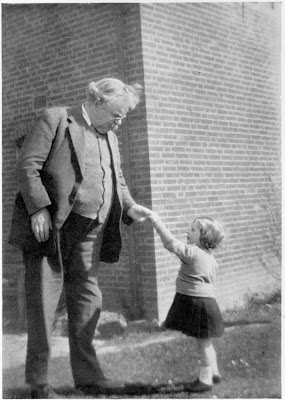
G. K. Chesterton wrote some 52 stories in the Father Brown series.
This volume by the good people at Collector’s Library collects 18 of those stories. The Collector’s Library editions are nicely bound in a red cloth board, with a little red ribbon to keep your place. The books are small in size, small enough to slip in your pocket, with wafer thin pages edged in gold to give them that extra touch of class. If you’re precious about reading from nice books (and I am), then reading from one of these volumes will make the experience all the more special.
Despite Chesterton’s prolific output, his reputation rests mostly on his Father Brown stories. They’re detective mystery stories, mostly involving murders, finely written with sometimes a touch of humour.
Father Brown is a paradoxical figure. He’s a Catholic priest who doubles as a crack detective. Nowadays we think of a Catholic priest as a quaint kind of anachronism, and I presume Chesterton’s contemporaries were leaning to that opinion as well.
Being a priest, Father Brown of course has his own ideology. The ultimate truth is beyond doubt: God created the earth and universe. This is a truth so self-evident, so based on the powers of human reasoning, that it gazumps modern day science, and its ugly little sister, atheism. Indeed, sometimes the usually placid Father Brown gets quite hot under the colour when he people think otherwise.
Father Brown’s Catholicism isn’t the main theme of the stories though. In fact it’s a bit of a side issue really, part of the priest's many interesting philosophical and theological digressions.
What enchants the reader is Father Brown's odd character and strange manner. We love how he turns up when we least expect it; we marvel at how he knows so much about a crime that has already happened. We gasp in astonishment when he picks up some details that we the reader have overlooked. So powerful and subtle is his intellect that even us staunch atheists feel that Father Brown could quite possibly turn us into believers.
So it is this mixture that makes the Father Brown stories a great success: the unconventional priest who sees things we ordinary mortals merely pass over. When our ignorance is shown up, we feel that our modern, secular intellectual framework is not all it is famed to be.
In the afterward by David Pinching, the writer says how much G. K. Chesterton is like Samuel Johnson ‘whose very flexibility tends to baffle the modern reader’. I couldn’t agree more. Both were conservative Christian men of powerful yet subtle intellects who quite frequently baffle the reader. They seem like visionaries, and you wonder, what do they see that we always seem to miss?
These stories also reminded me very much of the films of Alfred Hitchcock, and it seems obvious that he must have been extraordinarily influenced by Chesterton's fiction. Hitchchock’s plots centre on human psychology and motivation, themes all mirrored in the Father Brown stories.
No comments:
Post a Comment